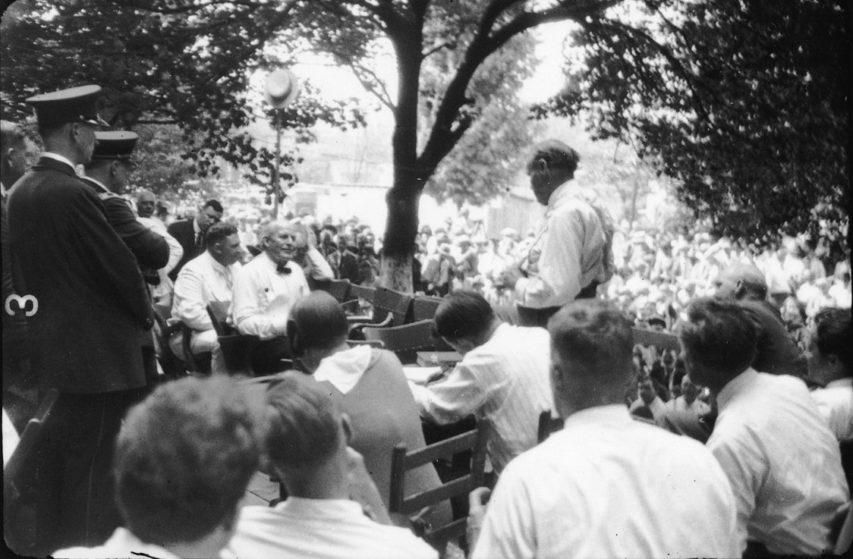World War Two
Published 16 Nov 2022How do you motivate men to leave home and go fight in a foreign land? Send them packing with Betty Grable, Rita Hayworth, and Irene Manning, of course! It helps if you include an Esquire magazine and girlie cartoons from the infamous Alberto Vargas.
(more…)
November 17, 2022
The Pornstars of World War Two – Pin-Ups – On the Homefront 017
June 24, 2022
The Guardians of Free Speech
ReasonTV
Published 23 Jun 2022Because of the social media circus surrounding the Johnny Depp/Amber Heard defamation trial, it was easy to overlook one of the principal — yet least likely — actors in the courtroom drama: the American Civil Liberties Union (ACLU), which ghostwrote and placed the 2018 Washington Post op-ed by Heard about surviving domestic abuse that was the basis of the trial.
——————-
It’s only the latest example of how the group has in recent years strayed from its original mission of defending speech, no matter how vile. Awash with money after former President Donald Trump was elected, the ACLU transformed into an organization that championed progressive causes, undermining the principled neutrality that helped make it a powerful advocate for the rights of clients ranging from Nazis to socialists.
It questioned the due process rights of college students accused of sexual assault and harassment under Title IX rules. It ran partisan ads against Supreme Court nominee Brett Kavanaugh and for Georgia gubernatorial candidate Stacey Abrams, a move that current Executive Director Anthony Romero told The New York Times was a mistake. The ACLU also called for the federal government to forgive $50,000 per borrower in student loans.
As the ACLU recedes from its mission, enter another free speech organization, the Foundation for Individual Rights in Education, or FIRE. Founded in 1999 to combat speech codes on college campuses, FIRE is expanding to go well beyond the university and changing its name to the Foundation for Individual Rights and Expression. The group has raised $29 million toward a three-year “litigation, opinion research and public education campaign aimed at boosting and solidifying support for free-speech values.”
“I think there have been better moments for freedom of speech when it comes to the culture,” says FIRE’s president, Greg Lukianoff. “When it comes to the law, the law is about as good as it’s ever been. But when it comes to the culture, our argument is that it’s gotten a lot worse and that we don’t have to accept it.”
Lukianoff tells Reason that FIRE’s new initiatives have been in the works for years, but gained urgency during the COVID lockdowns. “Pretty much from day one, people have been asking us to take our advocacy off campus to an extent nationally,” he says. “But 2020 was such a scarily bad year for freedom of speech on campus and off, we decided to accelerate that process.” Despite 80 percent of campuses being closed and doing instruction remotely, Lukianoff says that FIRE received 50 percent more requests for help from college students and faculty. He also points to The New York Times‘ editorial page editor, James Bennet, getting squeezed out after running an article by Sen. Tom Cotton (R–Ark.) and high-profile journalists such as Bari Weiss, Andrew Sullivan, and Matt Yglesias “stepping away from [their publications], saying that the environment was too intolerant.”
FIRE is also expanding its efforts beyond legal advocacy and into promoting what Lukianoff calls “the culture of free speech.” As Politico reports, it will spend $10 million “in planned national cable and billboard advertising featuring activists on both ends of the political spectrum extolling the virtues of free speech.”
He says that people in their 40s and 50s grew up in a country where the culture of free speech was embedded in colloquial sayings and common attitudes. “Things like everyone’s entitled to their opinion, which is something you heard all the time when we were kids. It’s a free country, to each their own, statements of deep pluralism, like the idea that [you should] walk a mile in a man’s shoes,” he explains. “All of these things are great principles for taking advantage of pluralism, but they’ve largely sort of fallen out of usage due to a growing skepticism about freedom of speech, particularly on campus, that’s been about 40 years in the making.”
Lukianoff has nothing negative to say about the ACLU (in fact, he used to work there) and stresses that FIRE has worked with the organization since “day one” and continues to do so. But unlike the ACLU, FIRE isn’t at risk of turning into a progressive advocacy organization, partly because its staff is truly bipartisan.
That pluralistic pride extends to the groups funding FIRE, too. Lukianoff thinks that despite the rise of cancel culture, most Americans still understand the value of free speech, but they need to be encouraged to stand up for it. FIRE’s polling, he says, reveals that “it’s really a pretty small minority, particularly pronounced on Twitter, that is anti-free-speech philosophically and thinks that people should shut up and conform.”
For that reason, he’s upbeat that FIRE will succeed in helping to restore belief in the value and function of free speech.
Interview by Nick Gillespie. Edited by Regan Taylor.
June 8, 2022
With the ACLU no longer fit for purpose, FIRE steps up to protect freedom of speech on and off the campus
Matt Taibbi talks to Nico Perrino about the Foundation for Individual Rights in Education (FIRE) moving beyond protecting free speech for university students to protecting those rights for all Americans:
After years of planning, the Foundation for Individual Rights in Education, better known as FIRE, announced a major expansion Monday, moving “beyond college campuses to protect free speech — for all Americans”.
FIRE was the brainchild of University of Pennsylvania history professor Alan Charles Kors and Boston civil liberties lawyer Harvey A. Silverglate, who co-authored the 1999 book, The Shadow University: The Betrayal of Liberty on America’s Campuses. To the modern reader the book reads like a collection of eccentric cases of students and teachers caught up in speech code issues, most (but not all) being conservative.
To take just one of countless nut-bar examples, Kors and Silverglate told the story of a professor in San Bernardino reprimanded for violating sexual harassment policies because, among other things, “he assigns provocative essays such as Jonathan Swift’s ‘A Modest Proposal'”, as the court case later put it. This was apparently the “cannibalism” portion of the accusation that he delved into such subjects as “obscenity, cannibalism, and consensual sex with children”.
The book triggered such an overwhelming number of responses from other faculty members and students that the pair decided to set up an organization to defend people who found themselves in tricky speech controversies on campuses. They soon found they had plenty of work and, by 2022, enough of a mandate to expand beyond colleges and universities into America at large. According to FIRE CEO Greg Lukianoff, as quoted in a Politico story, the group has already raised over $28 million toward a $75 million “litigation, opinion research and public education campaign aimed at boosting and solidifying support for free-speech values”.
As noted in another story I put out today, FIRE will be doing a lot of stepping into a role semi-vacated by the American Civil Liberties Union. I spoke with Nico Perrino of FIRE, producer and co-director of the excellent documentary about former ACLU chief Ira Glasser (see review here), to ask what the expansion would entail …
May 13, 2022
“How do they resist the logic of O’Sullivan’s Law?”
In The Critic, Ben Sixsmith considers the oddities of organizations explicitly founded to advance certain goals who steadily morph out of recognition to the point they appear to be working against their original mission:
In 1989, John O’Sullivan of National Review coined O’Sullivan’s Law: “all organisations that are not actually right-wing will over time become left-wing.” Countless examples spring into the mind like toast. Is the Church of England a religious institution or a Lib Dem think tank with some eccentric uniforms? Of course religion and politics are going to intersect, but when archbishops start opining on Brexit you have to wonder. Is the Amnesty International which is now so heavily concerned with trans rights and abortion rights the same Amnesty International that used to defend political prisoners, or a kind of imitator? Both, I guess.
But how inevitable is O’Sullivan’s Law? In recent times, some institutions have avoided drifting leftwards. Substack, a platform for writers and podcasters, have raised progressive hackles by refusing to exclude alleged transphobes. “As we face growing pressure to censor content published on Substack that to some seems dubious or objectionable,” its founders have boldly said, “our answer remains the same: we make decisions based on principles not PR, we will defend free expression, and we will stick to our hands-off approach to content moderation.” Elsewhere, Elon Musk has attempted to purchase Twitter in explicit opposition to its censorious policies.
Clearly, and understandably, neither institution aims to be “right-wing” (except inasmuch as anything which is not explicitly progressive earns the label). Nor do many others. How do they resist the logic of O’Sullivan’s Law?
As a grubby hack I have no more experience running large organisations than I do making rockets and curing heart disease, but I have a couple of modest suggestions. First, the leaders of an institution should ensure that its values are not open-ended but contextually specific. You can be “inclusive” in the concrete sense that anyone can be included among applicants, for example. But if “inclusivity” is just a vague ideal, then the demands made in its name are liable to expand until your institution is no more than an excuse for an HR department.
Second, such leaders should surround themselves with people who admire the essential ethos of the institution. Conquest’s Second Law (named after Robert, the historian) states, “The behaviour of an organisation can best be predicted by assuming it to be controlled by a secret cabal of its enemies.” (Conquest pointed out that this can be literally true, such as when a bunch of smart young lads from good families graduated from Cambridge to the Secret Intelligence Services and started feeding information to the Soviets.) You can disagree on 99 out of 100 things but you have to share core premises. If I start a panda preservation society, for example, it makes no sense to give a management position to someone who thinks conserving endangered species is a waste of money and pandas are faintly ridiculous creatures. Their qualifications and experience are immaterial.
Third, an institution should not seek scale at the expense of integrity. This is especially the case with non-profit institutions. Expansion — and all the jolly business of fundraising and management that comes with it — can emphasise the means of its existence over its ends. This then makes it vulnerable to redirection.
Fourthly, and finally, any leader of an institution (especially a business) should avoid the temptation to use progressive cultural causes as a means of “woke-washing” themselves. You know what I mean. It seems like an easier way of getting moral status than, say, treating workers well. But (and I will phrase this in cynical terms because self-interest means more to us than ethics) we would do well to remember that demands can escalate. Workers can be satisfied. Professional activists? Not so much.
March 29, 2021
Requiring only men to register for the draft isn’t the real problem — the problem is the draft itself
Kerry McDonald fears that the current challenges to the gender inequality of the US draft may end up making the underlying problem worse:
Currently, all American men are required to register for the draft through the Selective Service System when they turn 18, and could be forced into military service if the draft was activated. As a mom with young sons, I shudder at this prospect.
Lawyers with the American Civil Liberties Union (ACLU) have filed a petition asking the Supreme Court to rule the current military draft registration unconstitutional because it requires only men to register, not women. As a mom with young daughters, I shudder at this prospect.
While draft registration does involve unequal treatment of men and women, and women have been ably serving in the military for years, including in full combat, the larger issue is Selective Service registration itself. Current draft registration may be unconstitutional, but it shouldn’t exist at all.
Forcing citizens into any kind of non-voluntary work or action is antithetical to the principles of a free society.
Some contend that conscription is necessary to defend those principles if there were not enough volunteers to serve in a wartime effort, but is slavery ever justifiable? Who decides? If there are not enough soldiers to willingly fight a war, should the war be fought?
Nobel-Prize-winning economist Milton Friedman was one of the key figures who succeeded in persuading the US to move to an all-volunteer army in 1973, arguing against military conscription. Friedman wrote that “any system involving compulsion is basically inconsistent with a free society.” He went on to argue: “The continued use of compulsion is undesirable and unnecessary. We can and should man our armed forces with volunteers.”
In place of conscription, Friedman advocated for a voluntary military guided by free-market ideas. “The appropriate free market arrangement is volunteer military forces; which is to say, hiring men to serve,” Friedman wrote in his book, Capitalism and Freedom. “There is no justification for not paying whatever price is necessary to attract the required number of men. Present arrangements are inequitable and arbitrary, seriously interfere with the freedom of young men to shape their lives, and probably are even more costly than the market alternative.”
Friedman’s advocacy against conscription came to a climax in testimony with Army Chief of Staff, General William Westmoreland. The general disagreed with Friedman by claiming that the economist’s free-market approach would be akin to leading an army of mercenaries. Friedman replied: “General, would you rather command an army of slaves?”
July 21, 2019
Debunking the “common wisdom” about the “Scopes Monkey Trial”
Mark Pulliam explains what really caused the “Scopes Monkey Trial” and what was at stake … which doesn’t match up well at all against what little most people will remember about it today:

William Jennings Bryan (seated at left) being interrogated by Clarence Darrow, during the trial of the State of Tennessee v. John Thomas Scopes, July 20, 1925. That Monday afternoon, because of the extreme heat, Judge Raulston moved court proceedings outdoors. The session was held on a platform that had been erected at the front of the Rhea County Courthouse to accommodate ministers who wanted to preach during the time of the trial. Defense lawyers for Scopes (John R. Neal, Arthur Garfield Hays, and Dudley Field Malone) are visible seated to the extreme right. One of the men at left, with his back to the photographer, appears to be Scopes. The court reporters are seated at the table.
Photograph by Watson Davis via Wikimedia Commons.
We are again in another contentious period in America where battles over our culture and how we should live together are acrimonious. But there have been many points in our history that indicate we are only re-engaging a form of politics that is quintessentially American. One prominent past episode that occurred in Dayton, Tennessee during the summer of 1925 — the so-called “Scopes Monkey Trial” — has captured the American imagination like few legal proceedings ever have. Noted trial lawyer Clarence Darrow was part of the large legal team representing a 24-year-old substitute high school teacher, John Thomas Scopes, who was accused of violating the state’s Butler Act, which prohibited the teaching of evolution in a state-funded school. The celebrity co-prosecutor was William Jennings Bryan, the three-time Democratic presidential nominee, former Nebraska congressman, and Secretary of State to President Woodrow Wilson. Both Darrow and Bryan were prominent Progressive figures. Bryan, a left-wing evangelical and a fiery orator, is best known for his “Cross of Gold” speech at the 1896 Democratic National Convention.
The trial provided an opportunity for Darrow, whose reputation had been sullied by questionable tactics employed in the defense of radical labor leaders, to vindicate himself before a national audience. Chicago’s WGN radio station broadcast the trial nationwide and hundreds of reporters, some of them from overseas, covered the case. Geoffrey Cowan, author of the exhaustively-researched book The People v. Clarence Darrow, notes that Darrow achieved national notoriety, “won the support of Eastern sophisticates,” and “found new acceptance” as a result of the widely-publicized trial, especially his alleged humiliation of Darrow’s “old hero,” Bryan. This canard, which formed the dramatic crux of the 1960 movie Inherit the Wind, a highly-fictionalized depiction of the trial adapted from the 1955 play written by Jerome Lawrence and Robert E. Lee, is just one aspect of the popular mythology that surrounds the case.
Almost all of the “conventional wisdom” concerning the Scopes trial is false. Contrary to the impression created by Inherit the Wind and other popular accounts (including the sensational reportage of H. L. Mencken of The Baltimore Sun, one of the leading journalists of his day), the trial was not a fundamentalist inquisition, but an ill-conceived publicity stunt by Dayton businessmen who were trying to attract tourists to the small town — to put Dayton on the map. To generate a test case challenging the statute, the American Civil Liberties Union had offered to defend any teacher charged with violating the Butler Act, gratis. Dayton businessmen recruited Scopes to agree to serve as the defendant, even though he was unsure he had actually taught evolution. Nonetheless, Scopes volunteered to be charged. The trial — for a misdemeanor offense — was staged. Celebrity lawyers were solicited to participate for the sole purpose of increasing public interest in the case. The Baltimore Sun paid part of the defense’s expenses because it knew that the spectacle would sell newspapers, and it did. A lot of them.
I think it would be fair to say that H.L. Mencken had a passionate dislike for William Jennings Bryan, even after Bryan’s death a few days later:
It is the national custom to sentimentalize the dead, as it is to sentimentalize men about to be hanged. Perhaps I fall into that weakness here. The Bryan I shall remember is the Bryan of his last weeks on earth — broken, furious, and infinitely pathetic. It was impossible to meet his hatred with hatred to match it. He was winning a battle that would make him forever infamous wherever enlightened men remembered it and him. Even his old enemy, Darrow, was gentle with him at the end. That cross-examination might have been ten times as devastating. It was plain to everyone that the old Berserker Bryan was gone — that all that remained of him was a pair of glaring and horrible eyes.
But what of his life? Did he accomplish any useful thing? Was he, in his day, of any dignity as a man, and of any value to his fellow-men? I doubt it. Bryan, at his best, was simply a magnificent job-seeker. The issues that he bawled about usually meant nothing to him. He was ready to abandon them whenever he could make votes by doing so, and to take up new ones at a moment’s notice. For years he evaded Prohibition as dangerous; then he embraced it as profitable. At the Democratic National Convention last year he was on both sides, and distrusted by both. In his last great battle there was only a baleful and ridiculous malignancy. If he was pathetic, he was also disgusting.
Bryan was a vulgar and common man, a cad undiluted. He was ignorant, bigoted, self-seeking, blatant and dishonest. His career brought him into contact with the first men of his time; he preferred the company of rustic ignoramuses. It was hard to believe, watching him at Dayton, that he had traveled, that he had been received in civilized societies, that he had been a high officer of state. He seemed only a poor clod like those around him, deluded by a childish theology, full of an almost pathological hatred of all learning, all human dignity, all beauty, all fine and noble things. He was a peasant come home to the dung-pile. Imagine a gentleman, and you have imagined everything that he was not.
H/T to “WarEagle82” for the link.
March 20, 2018
Free speech on the ropes
J.D. Tuccille says the right to freedom of speech isn’t dead, but it might not qualify for a new life insurance policy:
We have an environment in which the president of the United States is dismissive of the free speech rights of his opponents, prominent constitutional scholars sniff at free speech unless it’s used by the “right” people for their favored goals, and the country’s leading civil liberties organization is suffering an internal revolt by staffers who oppose “rigid” support for free speech protections.
Last October, President Trump said “It’s frankly disgusting the way the press is able to write whatever they want to write.” That came just hours after he tweeted, “With all of the Fake News coming out of NBC and the Networks, at what point is it appropriate to challenge their License? Bad for country!” And even before Trump took the oath of office, he’d huffed that protesters who burn American flags should face loss of citizenship or jail.
So if you’re an academic with expertise in constitutional law, and you have months to watch a populist politician who commands the power of the presidency fulminate about punishing those who criticize him, what do you do? If you’re Georgetown Law’s Louis Michael Seidman, you suggest that the president might be on to something.
In a forthcoming paper, Seidman’s main complaint is that free speech doesn’t inherently favor progressivism — it allows too much voice to people who disagree. “At its core, free speech law entrenches a social view at war with key progressive objectives,” writes Seidman.
Sure, “the speech right has instrumental utility in isolated cases,” he adds. But “significant upside potential”? Nah.
[…]
In its early days, the American Civil Liberties Union (ACLU) viewed free speech as a tool of social justice, suited to particular purposes under particular conditions,” wrote Weinrib, calling on the modern organization to rededicate itself to progressive political goals over civil libertarian advocacy.
The ACLU may be close to taking her advice. Last fall, about 200 of the organization’s staff members signed a letter objecting to the groups’ “rigid stance” on the First Amendment. The letter was characterized by former ACLU board member Michael Meyers as “a repudiation of free-speech principles.”
Huh. With a president who openly chafes at criticism and suggests media naysayers should be punished with the force of law, now seems like a perfect time for opponents to rally around unfettered debate and the First Amendment. Instead, lefty academics and activists are lining up to agree with Trump that a free press and individual rights to freedom of speech, belief, and association are indeed overrated overall.
July 15, 2017
The Scopes Trial in Dayton, Tennessee
As a long-time admirer of H.L. Mencken (since discovering Prejudices: A Selection in a used book store on Queen Street in the mid-1980s), I’ve always had an interest in the skullduggery around the “Scopes Monkey Trial” … and apparently so has Colby Cosh:

H.L Mencken celebrates the repeal of Prohibition, December 1933.
In a merely procedural sense, the Scopes Monkey Trial in Dayton, Tennessee, ended on July 21, 1925 with the conviction of biology teacher John T. Scopes on the charge of instructing students that “man has descended from a lower order of animals.” But of course the real Monkey Trial is eternal, winding its way anew through American life, decade after decade. The carefully staged publicity stunt in Tennessee was merely one occasion in a longer struggle over the nature of man and the limits of his knowledge. I know this is an old-fashioned romantic ACLU-liberal view of the matter, but I hold to it.
As I write this column, county officials in Dayton are unveiling a statute of Clarence Darrow, the garrulous, crooked lawyer who represented Team Enlightenment in the original 1925 contest between Darwinian evolution and the Scriptures. In 2005, the citizens of Dayton, where Monkey Trial tourism is now a crucial industry, erected a statue of William Jennings Bryan on the grounds of the immortal Rhea County courthouse. Bryan had been the chosen hero of evangelical Christianity in the trial, dying less than a week after its conclusion, and is the namesake of a local bible college, which paid for the statue.
[…]
I became a serious student of the Scopes Trial as an undergraduate. Like anybody else, I had seen the 1960 Hollywood rendering of the play about the trial, Inherit The Wind, which represents Bryan as an ignorant windbag, Darrow as a tired, patient figure of ostentatious nobility, and a thinly disguised H.L. Mencken as a cruel nihilist newspaperman. Today, I suppose I would regard Mencken as the real hero of the show. He was privy to the ACLU’s engineering of the trial as a publicity stunt, but he also always said that Tennessee was within its constitutional rights to forbid the teaching of evolution — to be, in his view, just as backward as its people wished.
Inherit The Wind makes its pseudo-Mencken a heartless guttersnipe mostly as a device for elevating a sympathetic Darrow even further. This is part of the movie’s major liberty with the events of the trial: it has Bryan drop dead in mid-rant at the moment of its culmination, instead of waiting a few days. What I discovered as a student was that, aside from this excusable concession to theatrical unity, the film probably deserves some kind of prize for general fidelity to historical events.
May 10, 2017
Raging Bitch, Good Shit, and Flying Dog Beer’s Fight for Free Speech
Published on 10 May 2017
“I’ve lived my life as a pro free enterprise person,” explains Flying Dog Brewery CEO Jim Caruso. “Not pro business. Pro free enterprise, pro consumer choice, artisanal manufacturing.”
—
A central player in America’s craft beer revolution, Caruso is dedicated to creating something special both inside and outside the bottle. Famed artist Ralph Steadman, best known for his iconic illustrations for work by Hunter S. Thompson, creates all of Flying Dog’s labels. It was Steadman who spontaneously wrote on his first commissioned label “good beer, no shit.” And it was this label that kicked of Flying Dog’s first — but not last — fight with government censors.Caruso sat down with Reason’s Nick Gillespie to talk about his run-ins with the state, why he is a libertarian, and the how his values keep him happy.
“I’m a happy person. And I attribute that to living as an individual, taking self responsibility, self reliance, but connected to society. It’s not a lone ranger sort of thing.”
Cameras by Meredith Bragg, Todd Krainin, and Mark McDaniel. Edited by Bragg.
December 12, 2015
The US government’s no-fly list
Kevin Williamson on the travesty that is the no-fly list:
There are many popular demons in American public life: Barack Obama and his monarchical pretensions, Valerie Jarrett and her two-bit Svengali act, or, if your tastes run in the other direction, the Koch brothers, the NRA, the scheming behind-the-scenes influences of Big Whatever. But take a moment to doff your hat to the long, energetic, and wide-ranging careers of three of our most enduring bad guys: laziness, corruption, and stupidity, which deserve special recognition for their role in the recent debates over gun control, terrorism, and crime.
The Democratic party’s dramatic slide into naked authoritarianism — voting in the Senate to repeal the First Amendment, trying to lock up governors for vetoing legislation, and seeking to jail political opponents for holding unpopular views on global warming, etc. — has been both worrisome and dramatic. The Democrats even have a new position on the ancient civil-rights issue of due process, and that position is: “F— you.” The Bill of Rights guarantees Americans (like it or not) the right to keep and bear arms; it also reiterates the legal doctrine of some centuries standing that government may not deprive citizens of their rights without due process. In the case of gun rights, that generally means one of two things: the legal process by which one is convicted of a felony or the legal process by which one is declared mentally incompetent, usually as a prelude to involuntary commitment into a mental facility. The no-fly list and the terrorism watch list contain no such due process. Some bureaucrat somewhere in the executive branch puts a name onto a list, and that’s that. The ACLU has rightly called this “Kafkaesque.”
Here’s where our old friends laziness and stupidity play a really prominent role: The no-fly list is not composed of identities, but merely names. Lots of people share the same name. So, for instance, the late Senator Ted Kennedy ended up on the no-fly list, because somebody had used his name (or a similar name) as an alias. Among people called “Kevin Williamson,” we find myself, the famous Scream screenwriter, a notable Scottish politician and political activist (he is also the author of Drugs and the Party Line), a Canadian entertainment journalist, a fine woodworker who sells his wares on Twitter, and a famous underwear model for whom I am unlikely to be mistaken. If a trip to the DMV or the IRS one day eventually sends me over the edge into full-on barking mad durka-durka-Mohammed-jihad territory, those other Kevin Williamsons are going to suffer simply because we share a name.
And, of course, every third actual dirtbag terrorist has the same name as a million other ordinary schmoes, because Arabic names tend to be a little repetitive. (Is there a Mohammed al-Mohammed in the house? Seriously, go to LinkedIn and see how many graphic designers and accountants walking this good green Earth share that name.)
September 9, 2015
“For some reason she rarely has the scarlet ‘(D)’ printed next to her name underneath the photos of her looking like an indignant troll doll”
Colby Cosh has more on the controversy over Kim Davis and her beliefs:
The U.S. District Court, petitioned by the unhappy couple, duly ordered Davis to cut out the nonsense at once. She continued to refuse, creating another much-photographed scene at her office, and was summoned back to court Sept. 3 to explain. The American Civil Liberties Union (ACLU), that tireless friend to the friendless, actually intervened on Davis’s behalf; it disagrees formally with her view on the law, but it asked that she be fined for contempt of court, rather than imprisoned.
Judge David Bunning was having none of it, and put her in the clink. He says he expects to revisit his decision after Davis has cooled her heels for about a week, after which time the gays and lesbians of Rowan County will have had a fair crack at obtaining permission to marry. Five of Davis’s six underlings told Judge Bunning they are willing to issue marriage licenses to same-sex couples in the meantime. The sixth is her son, but the judge indulgently overlooked his impudence and calculated that five pairs of writing hands would be plenty to handle the work.
The tangential presence of the ACLU in the legal battle reminds us that there are some features of the United States that remain admirable — that the country has not yet totally degenerated into a shouting match of contending personal narcissisms. Another one is that there have been at least as many demonstrators on behalf of same-sex marriage rights as friends of Kim Davis at the offices of the Rowan County clerk. It is, with all due respect, a place hitherto best known in American history for a 19th-century blood feud between moonshiners.
April 21, 2013
March 31, 2013
The question is not whether armed drones will be deployed domestically, but when
Glenn Greenwald presents a strong case that it is inevitable that armed drones will be deployed over the US:
The use of drones by domestic US law enforcement agencies is growing rapidly, both in terms of numbers and types of usage. As a result, civil liberties and privacy groups led by the ACLU — while accepting that domestic drones are inevitable — have been devoting increasing efforts to publicizing their unique dangers and agitating for statutory limits. These efforts are being impeded by those who mock the idea that domestic drones pose unique dangers (often the same people who mock concern over their usage on foreign soil). This dismissive posture is grounded not only in soft authoritarianism (a religious-type faith in the Goodness of US political leaders and state power generally) but also ignorance over current drone capabilities, the ways drones are now being developed and marketed for domestic use, and the activities of the increasingly powerful domestic drone lobby. So it’s quite worthwhile to lay out the key under-discussed facts shaping this issue.
I’m going to focus here most on domestic surveillance drones, but I want to say a few words about weaponized drones. The belief that weaponized drones won’t be used on US soil is patently irrational. Of course they will be. It’s not just likely but inevitable. Police departments are already speaking openly about how their drones “could be equipped to carry nonlethal weapons such as Tasers or a bean-bag gun.” The drone industry has already developed and is now aggressively marketing precisely such weaponized drones for domestic law enforcement use. It likely won’t be in the form that has received the most media attention: the type of large Predator or Reaper drones that shoot Hellfire missiles which destroy homes and cars in Pakistan, Yemen, Somalia, Afghanistan and multiple other countries aimed at Muslims (although US law enforcement agencies already possess Predator drones and have used them over US soil for surveillance).
March 11, 2013
March 6, 2013
ACLU to investigate the militarization of US police forces
At the Huffington Post, Radley Balko reports on a new ACLU campaign:
The militarization of America’s police forces has been going on for about a generation now. Former Los Angeles Police Chief Daryl Gates first conceived the idea of the SWAT team in the late 1960s, in response to the Watts riots and a few mass shooting incidents for which he thought the police were unprepared. Gates wanted an elite team of specialized cops similar to groups like the Army Rangers or Navy SEALs that could respond to riots, barricades, shootouts, or hostage-takings with more skill and precision than everyday patrol officers.
The concept caught on, particularly after a couple of high-profile, televised confrontations between Gates’ SWAT team and a Black Panther holdout in 1969, and then with the Symbionese Liberation Army in 1973. Given the rioting, protests, and general social unrest of the time, Gates’ idea quickly grew popular in law enforcement circles, particularly in cities worried about rioting and domestic terrorism.
[. . .]
Kraska estimates that total number of SWAT raids in America jumped from just a few hundred per year in the 1970s, to a few thousand by the early 1980s, to around 50,000 by the mid-2000s.
The vast majority of those raids are to serve warrants on people suspected of nonviolent drug crimes. Police forces were no longer reserving SWAT teams and paramilitary tactics for events that presented an immediate threat to the public. They were now using them mostly as an investigative tool in drug cases, creating violent confrontations with people suspected of nonviolent, consensual crimes.







